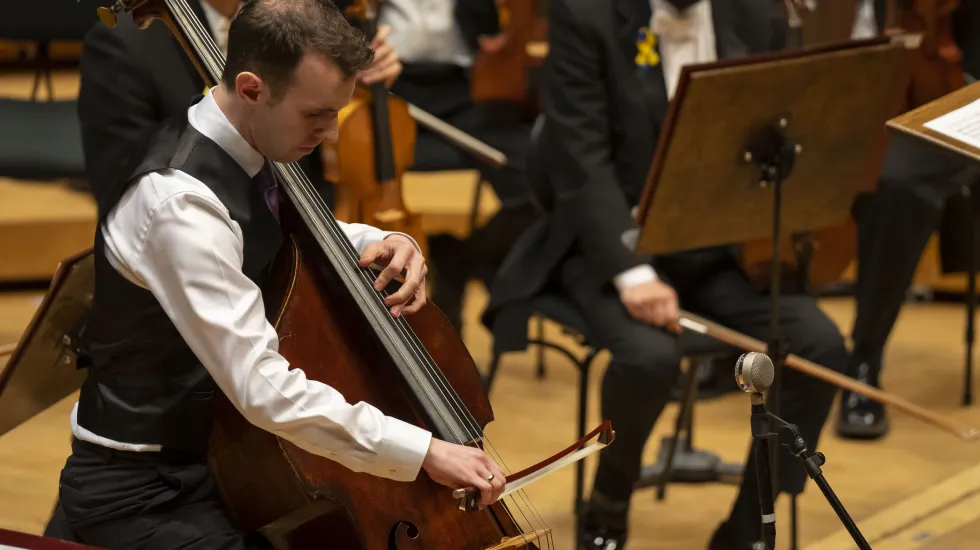
The musical creators whom the Chicago Symphony Orchestra chooses as composers-in-residence typically already have a significant and growing reputation, but the appointment adds an organizational imprimatur, a kind of seal of approval. In addition, the post comes with a series of significant perquisites, including performances of past works and commissions of new ones.
In the launch of a set of three concerts Thursday evening, the orchestra presented the first of three commissioned works by New York-based Jessie Montgomery, who began her three-year tenure as composer-in-residence in July.
When: 8 p.m. April 30; 7:30 p.m. May 3
Where: Orchestra Hall, 220 S. Michigan
Tickets: $39-$399
Info: cso.org
Continuing the coincidental emphasis on the number three, Montgomery’s world premiere was one of three selections on this anything-but-routine program, each offering its own distinctive source of interest and appeal.
Back on the podium was music director Riccardo Muti, who contracted COVID-19 in early April and was forced to cancel five conducting appearances. At that time, a symphony spokeswoman reported that the maestro’s symptoms were mild, and he appeared to be back in fine form Thursday evening.
Montgomery wrote “Hymn for Everyone” during the pandemic and, according to the program notes accompanying the 12-minute or so piece, it “snapped into focus” after the death of the composer’s mother in May.

The composer calls the work a “kind of meditation for orchestra,” and that seems like an apt description. But given the circumstances from which it emerged, it is not surprising that the hymn offers a troubled, unsettled meditation, almost a lamentation, with black clouds hanging overhead and dark currents running through it. Recurring sometimes insistently and sometimes even jarringly throughout are the chimes, which seem to signal the unstoppable passage of time at certain points and suggest a chilling death knell at others.
Montgomery clearly knows her way around the orchestra, creating multilayered ensemble sections, with, as she describes, mini-choirs within the whole, and searching solos for such instruments as the English horn and clarinet. The piece ends with a final angry downward scale in the low brass, culminating with a long, sustained chord—a kind of final meditation—for the flutes and trumpet.
The orchestra handled it all with aplomb, Muti infusing the work’s debut performance with smoldering intensity and nuanced drama.
Next came the orchestra’s first-ever performance of the Double Bass Concerto No. 2 in B minor by Giovanni Bottesini (1821-1889), a largely forgotten contemporary of Giuseppe Verdi who conducted the premiere of his opera, “Aida.”

This agreeable work, very much in the Romantic spirit of its time, has endured as a showpiece for the double bass, which is exactly what Bottesini, known as “the Paganini of the double bass,” wanted it to be. And in that way, it functions beautifully.
Because of its massive size, the double bass is sometimes misconstrued as musically ungainly and unwieldy. But as he breezed through the work’s tricky passagework, his left hand flying along the fingerboard, Alexander Hanna, the orchestra’s principal bassist, made the instrument seem just the opposite—lithe and graceful.
Perhaps most impressive was the singing fluidity and full-throated yet vibrant timbres he drew from the instrument, especially during the lovely, slow second movement. We are used to hearing the bass’ low, growling voice, but much of the writing in this piece was positioned in the instrument’s lesser-known, more cello-like middle register with the biggest surprises coming with some of the high notes that Hanna pulled off with ease.
As much as those two pieces had to offer, arguably the high point of the evening came in the second half as Muti and the orchestra offered a spellbinding take on Ludwig van Beethoven’s Symphony No. 6 in F Major, Op. 68, “Pastoral.”
Many times in the genial first movement and gentle, slow second movement Muti did not beat time at all, just offering a cue here, sometimes with a nod of his head, or a gesture there. This was not so much Muti interpreting this work but trusting the musicians and allowing the music to flow in a wonderfully free and unfettered way.







